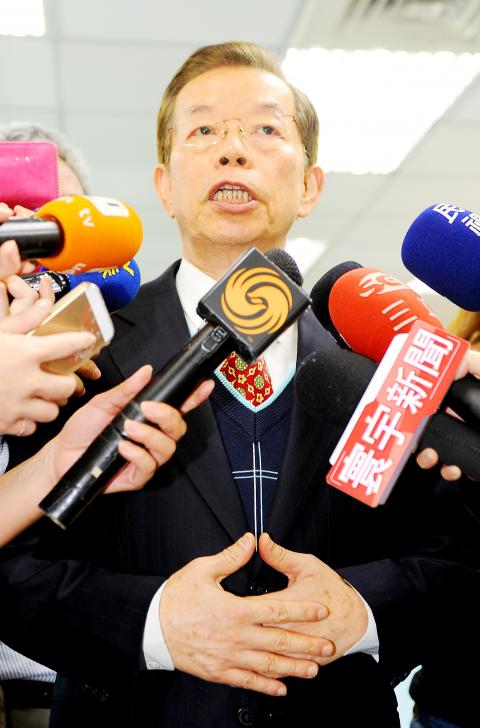Former premier Frank Hsieh (謝長廷) yesterday announced he would run for the chairmanship of the Democratic Progressive Party (DPP) in May, setting up a potential three-way race between Hsieh, incumbent DPP Chairman Su Tseng-chang (蘇貞昌) and former DPP chairperson Tsai Ing-wen (蔡英文) for the leadership.
Speaking to the media before the party’s weekly Central Standing Committee meeting, Hsieh formally announced his bid for the election, saying he could better promote his political vision and initiative and speed up party reform if he was chairman.
Su and Tsai have yet to publicly announce their intention to run, but their eventual participation is widely expected.

Photo: Taipei Times
Su did not comment on the announcement, while Tsai’s office that said that every DPP member has the right to participate in the election.
The senior politician, who is in the moderate wing of the party on China policy, has spent the majority of the past three years advocating his initiative of “two constitutions, different interpretations” (憲法各表), and said the proposal would be the solution to ease bilateral tensions between the DPP and Beijing.
Hsieh has never denied reports of his preference for an alliance with Tsai to go up against Su, who is also believed to be interested in the DPP’s nomination for the presidential election in 2016.
Asked about a “Hsieh-Tsai alliance,” Hsieh reiterated that he still favored a “division of labor” because it would be difficult for a party chairman to serve as a presidential candidate at the same time.
Hsieh repeatedly mentioned his private talks with Tsai about the alliance, but Tsai’s office denied there had been such meetings.
The former premier hinted at his bid in his weekly radio talk show on Tuesday night.
“Entering the election is not an issue to me. Dropping out from the race is,” he said.
During the talk show, Hsieh said his efforts to promote his “two constitutions, different interpretations” initiative for more than three years had finally paid off, with a recent opinion poll showing that 61 percent of respondents supported the proposal as the backbone of the DPP’s China policy.
“That was why I called for the party to organize a China policy debate. The leader of this party must have a clear policy on cross-strait relations,” he said.

The US government has signed defense cooperation agreements with Japan and the Philippines to boost the deterrence capabilities of countries in the first island chain, a report by the National Security Bureau (NSB) showed. The main countries on the first island chain include the two nations and Taiwan. The bureau is to present the report at a meeting of the legislature’s Foreign Affairs and National Defense Committee tomorrow. The US military has deployed Typhon missile systems to Japan’s Yamaguchi Prefecture and Zambales province in the Philippines during their joint military exercises. It has also installed NMESIS anti-ship systems in Japan’s Okinawa

‘WIN-WIN’: The Philippines, and central and eastern European countries are important potential drone cooperation partners, Minister of Foreign Affairs Lin Chia-lung said Minister of Foreign Affairs Lin Chia-lung (林佳龍) in an interview published yesterday confirmed that there are joint ventures between Taiwan and Poland in the drone industry. Lin made the remark in an exclusive interview with the Chinese-language Liberty Times (the Taipei Times’ sister paper). The government-backed Taiwan Excellence Drone International Business Opportunities Alliance and the Polish Chamber of Unmanned Systems on Wednesday last week signed a memorandum of understanding in Poland to develop a “non-China” supply chain for drones and work together on key technologies. Asked if Taiwan prioritized Poland among central and eastern European countries in drone collaboration, Lin

Renewed border fighting between Thailand and Cambodia showed no signs of abating yesterday, leaving hundreds of thousands of displaced people in both countries living in strained conditions as more flooded into temporary shelters. Reporters on the Thai side of the border heard sounds of outgoing, indirect fire yesterday. About 400,000 people have been evacuated from affected areas in Thailand and about 700 schools closed while fighting was ongoing in four border provinces, said Thai Rear Admiral Surasant Kongsiri, a spokesman for the military. Cambodia evacuated more than 127,000 villagers and closed hundreds of schools, the Thai Ministry of Defense said. Thailand’s military announced that

NO CONFIDENCE MOTION? The premier said that being toppled by the legislature for defending the Constitution would be a democratic badge of honor for him Premier Cho Jung-tai (卓榮泰) yesterday announced that the Cabinet would not countersign the amendments to the local revenue-sharing law passed by the Legislative Yuan last month. Cho said the decision not to countersign the amendments to the Act Governing the Allocation of Government Revenues and Expenditures (財政收支劃分法) was made in accordance with the Constitution. “The decision aims to safeguard our Constitution,” he said. The Constitution stipulates the president shall, in accordance with law, promulgate laws and issue mandates with the countersignature of the head of the Executive Yuan, or with the countersignatures of both the head of the Executive Yuan and ministers or